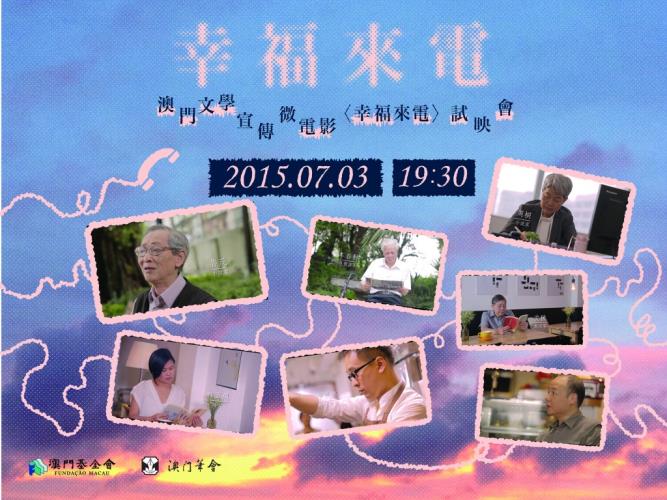Macao poet, novelist and columnist; winner of Macao Literary Awards (Fiction Category), and has won in other categories including Poetry and Prose. Published works include The Largo do São Domingos Countdown, a collection of his short stories; Ferris Wheel and A Fictional World, a collection of poetry and prose; and a series of promotional videos about Macao’s literature, co-published with other poets.

In the era of social media, microfilms or teasers are extremely important for the promotion of any products. For many publishers, videos have become an important means of publishing marketing. The last-stage promotion of literature, music, movies and dramas once again returned to a visual medium. Whether to use hard promotion (product ads) or soft marketing (product placements, microfilms), it depends on the promotion budget and idea.
In short, the success of a movie involves way more than what we imagine. Reading novels and poems nowadays is no longer mainstream entertainment, but novelists’ and poets’ works still have their values, and a lot of them are good reads. In order to be seen and attract people to read their books, visualisation is the only way. Obtaining assistance from the movie sector is naturally the most direct way.
In addition, a lot of agents will read and recommend good books to movie directors under them to initiate a literature-turned-movie project. Some directors may read themselves and discover good scripts suitable for shooting, and get in touch with the author.
As for the complicated adaptation process, how to find suitable or experienced personnel to connect ideas between authors and directors and visualise the scripts are also a topic that is worth discussing.
Currently, there is an extreme lack of professionals in the Macao movie industry in arduous positions like screenwriters. It seems that directors are more interested in shooting their own stories, and they haven’t thought about cooperating with the literature sector to create more cross-sector win-win situations. Stories written by directors are professionally revised by screenwriters; after a literary work is finished, it can be transformed into a shootable visual script through adaptations or screenwriters. This is perhaps an aspect that needs urgent handling in order to enhance movies’ quality. Certainly, there are not many writers in Macao that have the ability to make adaptations or be screenwriters – this is a realistic issue. How to better unify people in the arts sector, generate more impact through visualisation, in turn bring bigger values to individual products – these require more implementation and exchanges to gradually transform cross-sector cooperation into a habit.
The initial purpose of the shooting of When Felicity Calls into a microfilm was to promote the book Interview with Macao Writers 2. The publishing of the Interview aims to leave historical data for Macao’s literature. The actual result achieved by the microfilm was that it unveiled the masks of some old writers, and left some touching visual record for Macao’s literary history. This is in line with our initial purpose, and apparently all participating writers and their fans enjoy this microfilm a lot. I think that this microfilm can be used over and over in the upcoming book fairs, when promoting literature or at new book releases.
Certainly, from the perspective of literary history, I look forward to seeing more visual works like The Inspired Island and documentary Farming on the Wasteland directed by Macao director Choi Ian Sin. By recording authors’ writing process and life experiences, these films connect life with the city, and by watching these works, people can always get inspiration for their own works. As for the crossover between literature and movies, I encourage fellow friends in the movie and literary sector to continue paying attention to one another and discover more cooperation items to create more great products to attract more audiences. Currently, Chou Tong’s short story Youshan Meng and Pierre Wong’s medium-story Love is Colder Than Death have already entered Macao’s creation project. I will pay close attention for readers.
(When literature encounters movies; when movies encounter literature series – Part 3)